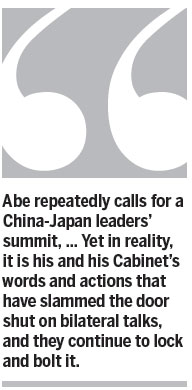With his domestic support on the decline, Japanese Prime Minister Shinzo Abe has reached the end of his diplomatic tether and should admit that playing the "China threat" card has not helped to win him the public's approval.
July opinion polls in Japan show the lowest approval ratings for the Abe Cabinet since it came into office in December 2012.
The reason is evident: After 20 months of busy "global diplomacy" visiting 47 countries or territories, Abe has been forced into a corner by his souring of relations with two of Japan's most important neighbors, China and South Korea.
Observers are now watching to see whether an anxious Abe will change his China policy in the run-up to November's Asia-Pacific Economic Cooperation Leaders' Meeting in Beijing, which is being viewed in some quarters as a possible occasion for face-to-face talks with President Xi Jinping.
After watching Abe's self-scripted drama for more than a year and a half, most people are familiar with its storylines: blaming China for the lack of high-level dialogue, playing the China-threat card for Japan's military expansion and defaming China worldwide.
Abe repeatedly calls for a China-Japan leaders' summit, while at the same time depicting Beijing as the villain refusing to talk. Yet in reality, it is his and his Cabinet's words and actions that have slammed the door shut on bilateral talks, and they continue to lock and bolt it.

It is commonsense that before two leaders sit down for talks, there needs to be an environment conducive to discussion. Preliminary diplomatic efforts are needed to clear the air before leaders meet. Otherwise, it is meaningless for two leaders to sit down together. Yet despite this, the Japanese media keep speculating about stealth envoys approaching China to sound out the possibility of a summit.
In the latest instance, several Japanese media have claimed that former Japanese prime minister Yasuo Fukuda, a frequent guest in China, met President Xi Jinping during a secret visit to the country in late July and broached the summit issue.
It is impossible that Xi would meet with a Japanese guest wanting to propose a leadership summit given the current situation. Using the media with the goal of putting China at a diplomatic disadvantage will not shake China's stance that the Abe administration should first take tangible actions to improve relations.
After taking office in late 2012, Abe's efforts to change the status quo in the territorial disputes with Japan's neighbors and rewrite Japan's historical record stunned diplomats in neighboring countries, and exhausted their trust and patience for talks with a sensible and responsible Japanese government.
These actions include re-examining the Kono Statement concerning Japan's wartime sex slavery, changing its textbooks to eliminate its shameful past, publicly quibbling about its wartime brutality, and visiting the infamous Yasukuni Shrine.
In the most recent instance, Abe has reinterpreted Japan's Constitution to lift the ban on collective self-defense, breaking the restrictions the international community imposed on the defeated country after World War II and derailing Japan's post-war pacifistic course.